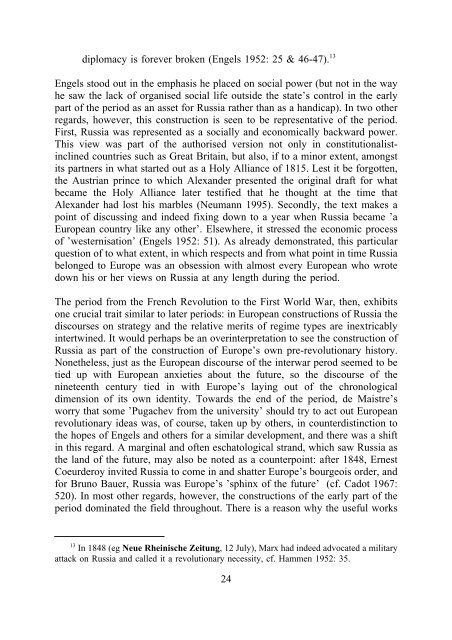RUSSIA AS EUROPE'S OTHER Iver B. Neumann European ...
RUSSIA AS EUROPE'S OTHER Iver B. Neumann European ...
RUSSIA AS EUROPE'S OTHER Iver B. Neumann European ...
Create successful ePaper yourself
Turn your PDF publications into a flip-book with our unique Google optimized e-Paper software.
diplomacy is forever broken (Engels 1952: 25 & 46-47). 13<br />
Engels stood out in the emphasis he placed on social power (but not in the way<br />
he saw the lack of organised social life outside the state’s control in the early<br />
part of the period as an asset for Russia rather than as a handicap). In two other<br />
regards, however, this construction is seen to be representative of the period.<br />
First, Russia was represented as a socially and economically backward power.<br />
This view was part of the authorised version not only in constitutionalistinclined<br />
countries such as Great Britain, but also, if to a minor extent, amongst<br />
its partners in what started out as a Holy Alliance of 1815. Lest it be forgotten,<br />
the Austrian prince to which Alexander presented the original draft for what<br />
became the Holy Alliance later testified that he thought at the time that<br />
Alexander had lost his marbles (<strong>Neumann</strong> 1995). Secondly, the text makes a<br />
point of discussing and indeed fixing down to a year when Russia became ’a<br />
<strong>European</strong> country like any other’. Elsewhere, it stressed the economic process<br />
of ’westernisation’ (Engels 1952: 51). As already demonstrated, this particular<br />
question of to what extent, in which respects and from what point in time Russia<br />
belonged to Europe was an obsession with almost every <strong>European</strong> who wrote<br />
down his or her views on Russia at any length during the period.<br />
The period from the French Revolution to the First World War, then, exhibits<br />
one crucial trait similar to later periods: in <strong>European</strong> constructions of Russia the<br />
discourses on strategy and the relative merits of regime types are inextricably<br />
intertwined. It would perhaps be an overinterpretation to see the construction of<br />
Russia as part of the construction of Europe’s own pre-revolutionary history.<br />
Nonetheless, just as the <strong>European</strong> discourse of the interwar perod seemed to be<br />
tied up with <strong>European</strong> anxieties about the future, so the discourse of the<br />
nineteenth century tied in with Europe’s laying out of the chronological<br />
dimension of its own identity. Towards the end of the period, de Maistre’s<br />
worry that some ’Pugachev from the university’ should try to act out <strong>European</strong><br />
revolutionary ideas was, of course, taken up by others, in counterdistinction to<br />
the hopes of Engels and others for a similar development, and there was a shift<br />
in this regard. A marginal and often eschatological strand, which saw Russia as<br />
the land of the future, may also be noted as a counterpoint: after 1848, Ernest<br />
Coeurderoy invited Russia to come in and shatter Europe’s bourgeois order, and<br />
for Bruno Bauer, Russia was Europe’s ’sphinx of the future’ (cf. Cadot 1967:<br />
520). In most other regards, however, the constructions of the early part of the<br />
period dominated the field throughout. There is a reason why the useful works<br />
13 In 1848 (eg Neue Rheinische Zeitung, 12 July), Marx had indeed advocated a military<br />
attack on Russia and called it a revolutionary necessity, cf. Hammen 1952: 35.<br />
24

















